
The oil fever has struck the Arctic sooner than expected. Several of the world’s biggest oil companies are vying for access to Greenland after a gas discovery last month raised expectations for offshore exploration around the inhospitable nation.
Greenland, the planet’s largest island with a population of just over 56,000, had been searching for the black gold for decades. In the past, however, Greenlanders have been destined to make a living from fishing and $600 million in annual subsidies from the Danish motherland (making up 55 precent of the island’s budget – or 0.75 percent of Denmark’s.) So, quite understandably, a majority of Greenlanders are now looking favorably upon the latest developments and are supporting oil exploration as a way to create jobs and wealth in a country troubled by high unemployment and social problems such as alcoholism and the world’s highest suicide rate.
Besides, the islanders are hopeful the oil might yield sufficient revenue to finally throw off the yoke of external rule and maybe even turn their icy island into an Arctic Kuwait.
These developments come soon after Greenland’s latest step towards independence. Already in 1979, Denmark granted home rule to Greenland, and in November 2008, voters in Greenland overwhelmingly approved a plan for expanding the island’s autonomy. The plan (which Denmark supported) allowed the small, mostly Inuit population to take control over the local police force, courts and coast guard and to make Greenlandic, an Inuit tongue, the official language.
It also set new rules on how to split future oil revenues between Greenland and Denmark, giving Greenland the first $13 million of annual revenues, while anything beyond that would be split equally between Greenland and Denmark. The new status quo then took effect on 21 June 2009, leaving the Danish royal government in charge only of foreign affairs, security and financial policy, while still providing the $600 million annual subsidy (or approx. $11,300 per Greenlander.)
One week after the Scottish exploration group Cairn Energy proclaimed it had discovered gas in offshore Greenland, four Greenpeace activists scaled the company’s oil rig, thereby forcing an end to all drilling operations. Greenland’s government reacted immediately to the threat posed by the eco-warriors, declaring that they were “not welcome” by the people of Greenland, and had them swiftly arrested and extradited.
However, this dramatic approach by Greenpeace campaigners only marks the first skirmishes in a critical environmental battle which is sure to follow. While the oil industry is desperate to find new drilling fields to meet the world’s insatiable demand for fuel, the global environmental movement is preparing for a fight in a post-Deepwater Horizon world.
In this particular case, however, Greenpeace was absolutely right to cry wolf. The Arctic Sea is a spectacularly unfriendly place for drilling, fraught with risks from drifting icebergs to hostile weather. Drilling in this area is only possible for a few months between July and early October; for the rest of the year the sea-ice becomes too thick to allow vessels to operate.
That means that an oil spill in such cold and remote waters could (and most probably would) prove devastating. Should a leak occur it may very well be impossible to drill a relief well until at least the following year, potentially allowing oil to flood into the Arctic waters for months on end.
While it is great news for Greenland to finally be able to move away from its dependence on fishing, tourism and handouts from Denmark, this is a time when caution is advised. As the technology is not yet available for safe Arctic drilling, environmentalists’ demands seem justified.
The backlash against the oil industry caused by the BP disaster in the Gulf of Mexico provides a huge opportunity not only for the environmental movement, but also for Greenland’s government. Greenland must now set the highest standards for future drilling. If it is not careful, the island might otherwise find itself no longer within the Danish embrace, but instead strangled by the cold hands of global oil companies.
Check out the ISN’s resources on Greenland, the Arctic or Natural Resource Exploration for further information.

